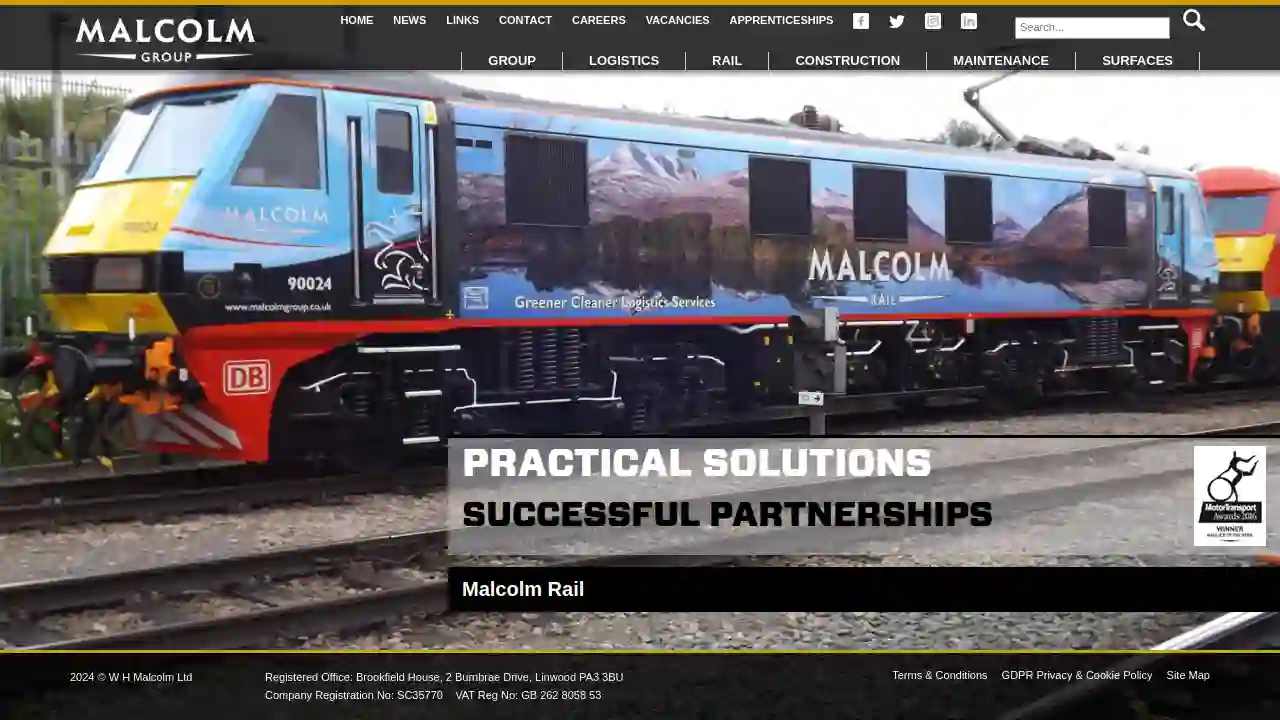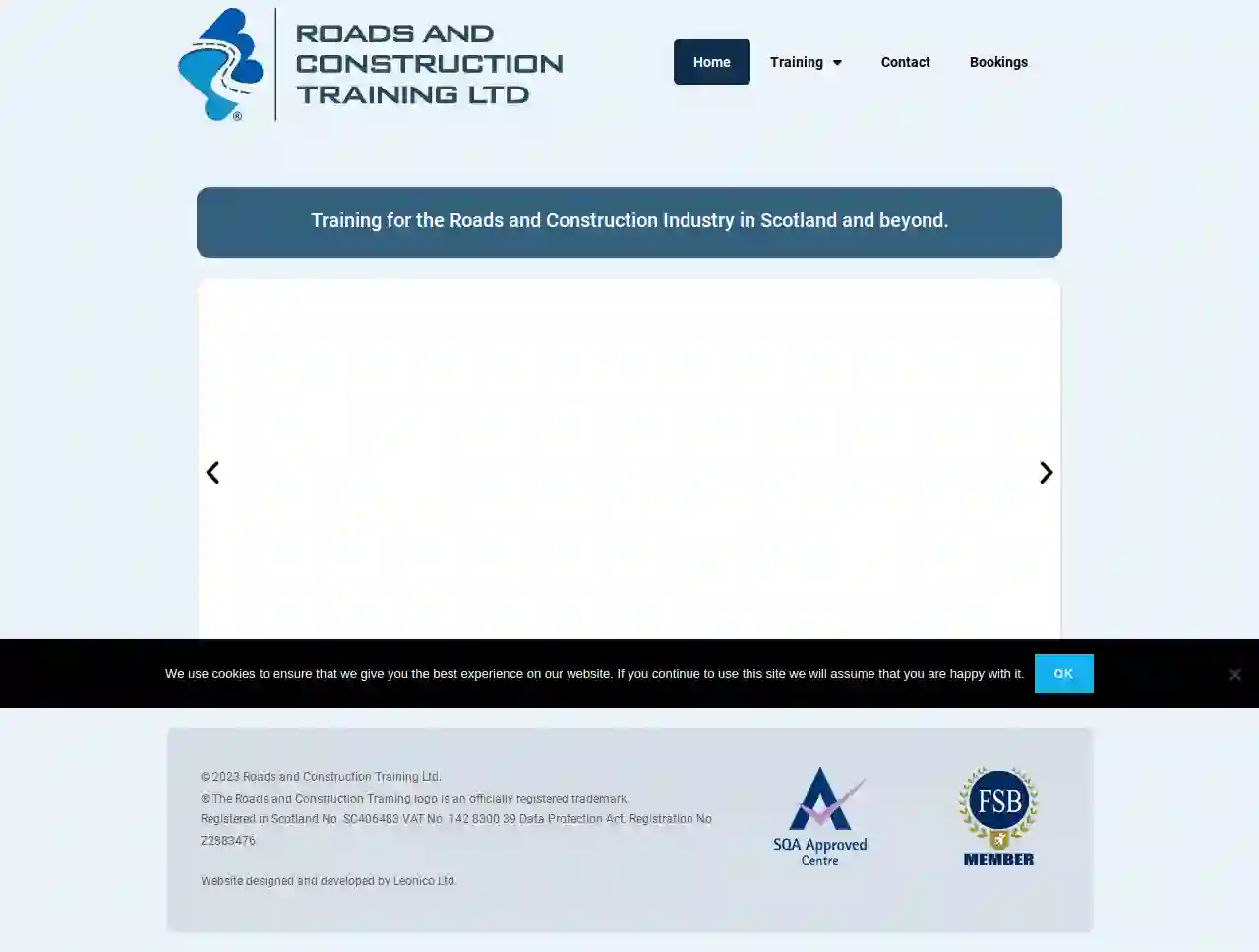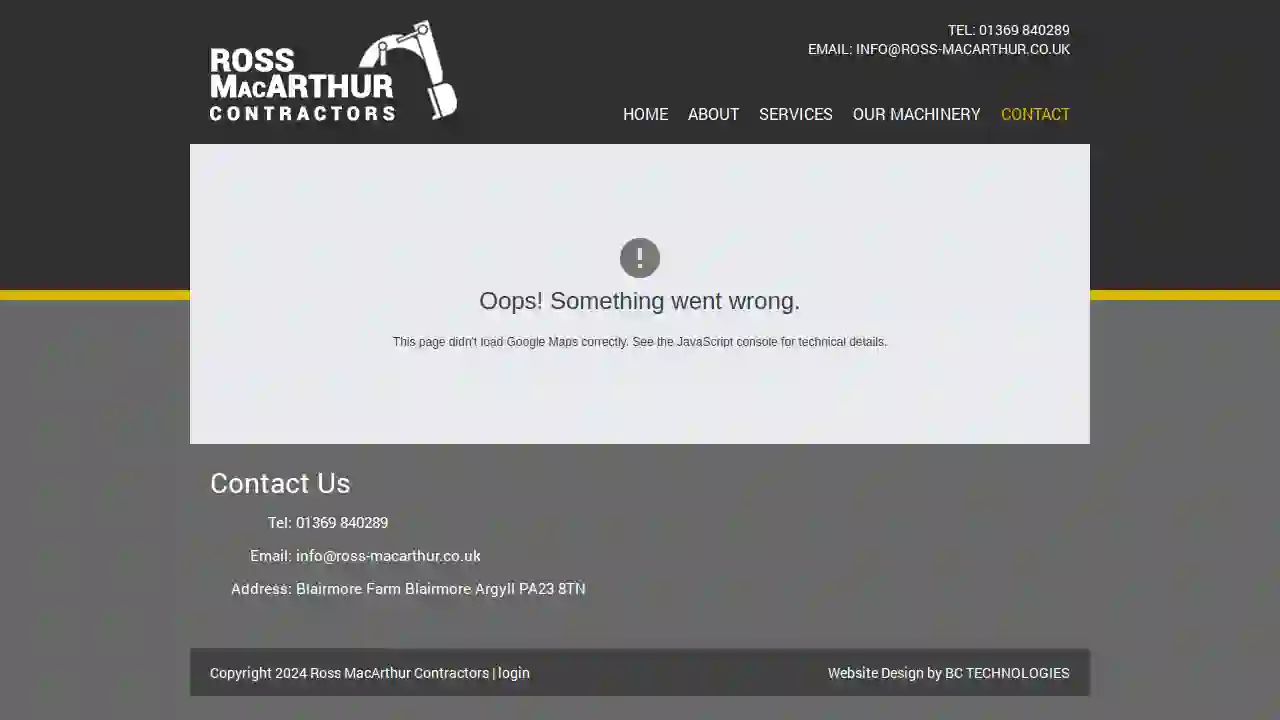Excavation Contractors Barrhead
Find top Excavation Contractors in Barrhead
Receive multiple Excavating Contractors quotes for your project today! Compare profiles, reviews, accreditations, portfolio, etc... and choose the best deal.

M A M Contracting Ltd
56 reviewsThe Office Templemill Farm, Crieff, PH7 4HL, GBBeing Better, Never Stops: Experienced Construction Contractors Established in 2004, MAM Contracting has quickly gained a reputation as a reliable and high-quality civil engineering and construction company in Scotland. With our range of services, highly skilled team of multidisciplinary tradespeople and dedication you won't find with anyone else, we're the perfect team for any project you have. MAM: A Leading Construction Company in Scotland & UK Wide MAM Contracting is an esteemed privately owned civil engineering company based in Scotland and serving the whole of the UK. We provide a wide range of engineering and construction services tailored to meet the needs of various market sectors. Whilst the majority of our work takes place in Scotland, we are happy to travel throughout the UK for the right type of job.
- Services
- Why Us?
- Accreditations
- Testimonials
- Gallery
Get Quote
Malcolm Construction
441 reviewsBrookfield House, 2 Burnbrae Drive, Linwood, PA3 3BU, GBThe Malcolm Group The Malcolm Group is a leading provider of practical solutions to businesses throughout the UK. We offer a wide range of services, including logistics, rail, construction, maintenance, and surfaces. We are committed to providing our customers with the highest quality of service and value for money. Our History The Malcolm Group has a long and proud history, dating back to 1934. We have grown from a small family business into a major player in the UK economy. We are committed to investing in our people and our infrastructure to ensure that we can continue to provide our customers with the best possible service. Our Values Our values are at the heart of everything we do. We are committed to: Providing our customers with the highest quality of service Investing in our people and our infrastructure Being a responsible and sustainable business Building strong relationships with our customers and suppliers
- Services
- Why Us?
- Gallery
Get Quote
Roads and Construction Training Ltd
Glasgow, GBTraining for the Roads and Construction Industry in Scotland and beyond. Roads and Construction Training are a professionally run training organisation whose instructors are all experts within their own fields of operations, roadwork’s, construction and utilities sectors. Having been approved by the Awarding body SQA, we can provide an extensive range of highly recognised awards, all of which comply with The Government Legislative requirements of HSE and SQA, and The National Occupational Standards, also that of The National Specification Requirements for NRSWA and Codes of Practice associated within Roadwork’s Specifications for working on Roads, Highways.We are about “Taking the Training to the Client, not the Client to the Training”. On-Site Training and AssessmentEquipped to provide On-site training and assessment where required, our highly experienced and qualified staff are committed to providing a quality service where ever the need maybe. Nowadays within the Roads, Construction and Utilities Industries there has never been a greater demand for the Improvement of Standards and Quality of Workmanship to improve. Our highly recognised qualifications awarded and approved by SQA, are for all occupations within these Industries mentioned above, and are aimed at all levels from the most junior to the most senior these qualifications are for youth and adult learning, they are highly recognised for improving personnel skills, employability and career prospects and are about improving and putting the skills back into the industry. Our service shall meet the standards with a view to improving them and to ensure we are achieving the highest level of satisfaction for our clients.
- Services
- Why Us?
- Accreditations
- Gallery
Get Quote
Rico Contracts
Unit 48, Greenhill Business Centre, Coatbridge, ML5 2AG, GBAbout Rico Contracts Ltd. Rico Contracts Ltd. is a closely knit group of experts, each specializing in their own field, who work together to form a formidable team. We are dedicated to providing the best possible service to our clients, ensuring that all maintenance needs are met, from a loose door handle to a complete overhaul of the surrounding grounds. We offer a variety of services at a reasonable cost, combining multiple resources and effective management for each job. Our commitment to health and safety is paramount, and we are proud to have an unblemished safety record. We operate with complete transparency, ensuring that everyone we work with can be assured of our high standards and tireless efforts to control any risk. We are also committed to environmental responsibility, operating a digital paperless system in the office and using biodegradable products wherever possible. We believe that we all have a moral duty to take care of our surroundings and take it seriously. Our priority is to conduct our business as cleanly and safely as we can while providing the best service possible to our clients. We are dynamic and dedicated to providing the best service possible to our clients. As we expand, we remain committed to our core values of quality, safety, and environmental responsibility.
- Services
- Why Us?
- Testimonials
- Gallery
Get Quote
Kelburne Construction
3.88 reviews8 Inkerman Place, Kilmarnock, KA1 2LL, GBWelcome to Kelburne Construction, one of Scotland’s leading Civil Engineering and Building Contractors. We are a long established, privately owned Civil Engineering Contractor and Building Company based in Kilmarnock, Scotland. Our professional reputation and success is built through encouraging pride at work for all our employees, which promotes enthusiasm and in turn provides an excellent ‘user friendly’ service for our customers. We are renowned for our top quality provision where consistency, reliability and client satisfaction are paramount. Established in 1979, we have grown steadily and have built up an extremely loyal client base. We work in close partnership with mainstream manufacturing companies who operate within the chemical and pharmaceutical industry and encompass some of the largest organisations in the United Kingdom.
- Services
- Why Us?
- Gallery
Get Quote
Dow Group Ltd
4.788 reviews23 Lenziemill Road, Cumbernauld, G67 2RL, GBA waste management, Skip hire and aggregates business based in Scotland. Dow Group UK is utterly dedicated to sustainability. Dow cares. Do you? You care about your environment. And so do we. It is at the heart of everything we do. Yes we’re a waste management company. We collect, sort and recycle household and commercial rubbish. But it’s what we do with it next that marks us out from our competitors. Every year thousands of tonnes are shipped to power people’s homes. The stuff you throw away is being re-used. By trusting Dow's services you'll be playing a small part in combating climate change. This makes you happy...and us proud. Discover DOW Group’s other services.
- Services
- Why Us?
- Testimonials
- Gallery
Get Quote
EBS Construction
3.89 reviews10 Loanbank Quadrant, Glasgow, G51 3HZ, GBEBS Construction: Your Trusted Partner for Property Maintenance and Restoration in Glasgow EBS Construction is a leading provider of property maintenance and restoration services in Glasgow. We are experts in all aspects of building restoration, including lime mortar, lead work, slate work, and specialist masonry. Our team of fully trained and highly skilled professionals across all trades ensures that we deliver a high-quality and fully comprehensive service. Our Commitment to Excellence At EBS Construction, we are committed to providing our clients with the highest quality workmanship and customer service. We subscribe to Construction Line, the UK register of Pre-Qualified Construction Services, giving our clients the assurance of our expertise and reliability. Our Services We offer a wide range of services, including: Project Management Conservation and Restoration work Specialist Masonry Re-pointing; lime mortar Structural repairs Roof repairs Complete internal and external decoration Domestic large and small Lead work Slate work Timber rot eradication Our Approach We are dedicated to delivering cost-effective and time-efficient solutions without compromising on quality. We utilize the latest industry technology from the initial planning stages to accurately plan and forecast projects. Our Directors and team of professional tradesmen work diligently to ensure that your project is completed to the highest standards, on schedule, and within budget. Why Choose EBS Construction? We are a trusted and experienced team with a proven track record of delivering exceptional results. We are committed to providing our clients with a seamless and stress-free experience. Contact us today for a free, no-obligation quote and let us help you bring your project to life.
- Services
- Why Us?
- Gallery
Get Quote
LD Home Improvements
Glasgow, GBAt LD Home Improvements, we pride ourselves on being Glasgow's premier choice for comprehensive home renovation and improvement services. With a passion for transforming spaces and a commitment to excellence, we offer a wide range of services designed to meet all your home improvement needs. Based in the heart of Glasgow, LD Home Improvements is a team of skilled professionals dedicated to delivering high-quality workmanship and exceptional customer service. Our expertise spans multiple areas of home improvement, ensuring that we can handle any project, big or small, with precision and care. Our Values Quality Workmanship: Delivering high standards in every project we undertake. Customer Satisfaction: Ensuring our clients are happy with our services through open communication and personalized solutions. Competitive Pricing: Offering transparent and fair pricing to provide excellent value for your investment.
- Services
- Why Us?
- Gallery
Get Quote
GAP Hire Solutions - Motherwell
3.623 reviewsCitypoint 2, 25 Tyndrum Street, Glasgow, G4 0JY, GBAt GAP Hire Solutions, we are committed to empowering your projects with efficiency, reliability, and unmatched innovation. Watch how our solutions seamlessly elevate your construction projects. Don't miss this opportunity to experience the future of construction. Our Divisions Plant Hire Tool Hire Lifting & TIC Non-Mechanical Trenching & Shoring Survey & Safety Welfare Services Tanker Services Event Services Pump Services If you have any questions or would like to discuss how GAP can uplift your projects, feel free to reach out to our friendly team here.
- Services
- Why Us?
- Gallery
Get Quote
Ross Macarthur Contractor Ltd
53 reviewsBlairmore Farm, Blairmore Argyll, Blairmore Farm Blairmore Argyll, Dunoon, PA23 8TN, GBAbout Ross MacArthur Contractors Ross MacArthur Contractors is a building and general contracting business based near Dunoon, in Argyll, Scotland. We undertake a mixed portfolio of civil works in the public and private sectors, from individual clients seeking to build or improve their own property right up to large-scale organisations that require support for their construction projects. Our History Ross MacArthur set up in business in 2003 as a sole trader. He hired out plant and equipment and undertook small agricultural contracting jobs himself, all from his base at Blairmore Farm. The business grew steadily, as, through word of mouth, Ross built a reputation for quality contracting work and hassle-free plant-hire. He soon branched out into construction work and gradually assembled a team of skilled plant operators and manual labourers, able to tackle jobs as diverse as sea wall protection, cable and pipe laying, road repairs and emergency remedial work for the energy industry. Our Growth By 2013 the business had grown to such an extent that the decision was made to create a limited company, Ross MacArthur Contractors Limited, which is solely owned by Ross himself. A separate but associated company, Ross MacArthur Plant Hire Limited, was created at the same time. Our Services Ross MacArthur Contractor Ltd has a fleet of around 15 machines available for hire on a short- or medium/longer-term basis, capable of tackling a wide range of specialist and general contracting duties. These vehicles can be supplied with fully certified, skilled operators who are adept at working in the often difficult terrain and frequently challenging weather conditions, which are characteristic of the Argyll and Bute region. Our Commitment We pride ourselves on providing a friendly, professional, customer-focussed service. So if you’re looking for plant or machinery hire or help with a building or contracting job, we would love to hear from you. We are more than happy to answer any queries or to discuss your project.
- Services
- Why Us?
- Gallery
Get Quote
Over 13,059+ Excavation Pros on our platform
Our excavation companies operate in Barrhead and beyond!
ExcavationHQ has curated and vetted the Best Excavation Businesses in Barrhead. Find a reliable pro today.
Frequently Asked Questions About Excavation Contractors
- Utility Locates: Contact your utility companies to mark the locations of underground lines before excavation begins. This is usually a free service.
- Hand Digging: Excavate carefully by hand near marked utility lines to avoid damage.
- Potholing: Digging small test holes to expose and verify utility depths and locations.
- Safe Distances: Maintaining a safe distance between excavation equipment and marked utility lines.
- Vacuum Excavation: Using vacuum excavation techniques to expose utilities without digging, reducing the risk of damage.
- Experience: Choose contractors with a proven track record and years of experience in excavation projects similar to yours.
- Licensing and Insurance: Verify that they are properly licensed to operate in your area and carry adequate insurance to protect you from liability in case of accidents or damage.
- Equipment and Resources: Ensure they have the necessary equipment and resources to handle your project efficiently and safely.
- Positive Reviews and References: Check online reviews and testimonials from previous customers. Request references and contact them to inquire about their experience with the contractor.
- Professionalism: Opt for a company that communicates clearly, provides detailed and transparent estimates, and has a responsive and courteous team.
- Determine the Area: Measure the length and width of the area you want to fill. Multiply them to get the area in square feet (or meters).
- Determine the Depth: Measure the difference between the existing grade and the desired grade (how much you need to raise the ground). This is the depth of fill required.
- Calculate Volume: Multiply the area (step 1) by the depth (step 2) to get the volume in cubic feet (or meters).
- Account for Compaction: Fill dirt compacts when it settles, so add 10% to 25% to the calculated volume to account for compaction. The exact percentage depends on the type of fill material.
What is the difference between topsoil and subsoil?
Topsoil: The uppermost layer, typically rich in organic matter, nutrients, and microorganisms. It's essential for plant growth and is often darker in color.
Subsoil: The layer beneath the topsoil, containing less organic matter and generally denser. It provides support for roots but is less fertile than topsoil.
During excavation, topsoil is often removed and preserved separately for later use in landscaping, while subsoil is typically used for backfilling or other less demanding applications.
How do you protect utilities during excavation?
How do I find a good excavation contractor?
How do I calculate how much dirt I need for fill?
What is the difference between topsoil and subsoil?
Topsoil: The uppermost layer, typically rich in organic matter, nutrients, and microorganisms. It's essential for plant growth and is often darker in color.
Subsoil: The layer beneath the topsoil, containing less organic matter and generally denser. It provides support for roots but is less fertile than topsoil.
During excavation, topsoil is often removed and preserved separately for later use in landscaping, while subsoil is typically used for backfilling or other less demanding applications.
How do you protect utilities during excavation?
- Utility Locates: Contact your utility companies to mark the locations of underground lines before excavation begins. This is usually a free service.
- Hand Digging: Excavate carefully by hand near marked utility lines to avoid damage.
- Potholing: Digging small test holes to expose and verify utility depths and locations.
- Safe Distances: Maintaining a safe distance between excavation equipment and marked utility lines.
- Vacuum Excavation: Using vacuum excavation techniques to expose utilities without digging, reducing the risk of damage.
How do I find a good excavation contractor?
- Experience: Choose contractors with a proven track record and years of experience in excavation projects similar to yours.
- Licensing and Insurance: Verify that they are properly licensed to operate in your area and carry adequate insurance to protect you from liability in case of accidents or damage.
- Equipment and Resources: Ensure they have the necessary equipment and resources to handle your project efficiently and safely.
- Positive Reviews and References: Check online reviews and testimonials from previous customers. Request references and contact them to inquire about their experience with the contractor.
- Professionalism: Opt for a company that communicates clearly, provides detailed and transparent estimates, and has a responsive and courteous team.
How do I calculate how much dirt I need for fill?
- Determine the Area: Measure the length and width of the area you want to fill. Multiply them to get the area in square feet (or meters).
- Determine the Depth: Measure the difference between the existing grade and the desired grade (how much you need to raise the ground). This is the depth of fill required.
- Calculate Volume: Multiply the area (step 1) by the depth (step 2) to get the volume in cubic feet (or meters).
- Account for Compaction: Fill dirt compacts when it settles, so add 10% to 25% to the calculated volume to account for compaction. The exact percentage depends on the type of fill material.